#sravana manana nididhyasana
Photo


🔱 Om Namo Bhagavathe Sri ArunachalaRamanaya 🔱
Photos by Guy Gonyea
🕉️
The Paramount Importance of Self Attention, by Sri Sadhu Om, As recorded by Michael James
Part Four - Mountain Path: January – March 2013 - Excerpt
Note of 1st January 1978
🕉️
Sadhu Om: When we awake from sleep we experience a new clarity of knowledge before we become aware of the body and world. The practice of sādhanā is trying to cling to this clarity.
Sitting in the Old Hall [where Bhagavan lived] is not essential if you are able to be aware of this clarity at other times. [...] There is something special in the Old Hall that automatically reminds us of our own being, but of course we can be aware of our being anywhere else as well.
Effort is unnecessary for self, because self-attention is natural and effortless. Effort is only needed for the mind. It is the nature of self to attend to self, and it is the nature of the mind to attend to second and third persons. Sādhanā is only for the mind, and the effort to attend to the feeling 'I' is only to keep the mind quiet — in its natural state of pure self-awareness.
It is not strictly true to say that self-enquiry begins with effort and ends with effortlessness, but for the sake of the sādhaka [practitioner] we may say so. Effort is required so long as the mind needs to be reminded of its true nature, 'I am', but when even awareness of second and third persons automatically reminds one of one's own existence, 'I am' (because what is aware of them is 'I'), then effort is no longer needed. When we can see only waves we must make some effort to notice the ocean underlying them, but when we knοω that the waves are nothing other than the ocean, effort is not needed.
All thoughts contain an element of the past or future in them. Can you make a thought about the present moment? If you seriously try to do so, all thoughts, including the thought 'I', will cease. This is another clue for self-attention. There are so many clues, you see.
🔱 🔱 🔱 🔱 🔱 🔱
Question: In practice we never actually attend to self. All the time we spend in the Old Hall we are only trying to do so. If we really attended to self for one moment, that would be liberation, would it not?
Sadhu Om: What, do you mean to say that even now you are not liberated? Are you not always attending to self? You knοω 'I am', and you only knοω something if you are attending to it. Even when you attend to second and third persons, it is 'I' that is attending, and that 'I' is always aware of itself.
Such manana [cogitation or deep reflection] is essential until you understand thoroughly that self-attention is natural and eternal and that all else shines by the light of that self-awareness. This manana will lead you right up to the boundary. Nididhyasαnα [contemplation, the practice of pure self-attention] is actually only for a moment. When you really practise what you have heard and understood, you cross the boundary, and that is jñāna.
Ignore the mind, it needn't concern us. We are not the mind, so when we lose interest in it, it will die a natural death. This is why Bhagavan is always drawing our attention to self. He never allows us to become interested in the thinking mind or anything other than the feeling 'I'.
'What is this 'I'? What is the source from which it appears?' — All that is required is that our interest in this feeling 'I' should increase. That is bhakti.
Enquiry, faith and bhakti are not contradictory. They are all necessary. Enquiry begins with faith. Unless we have faith in the guru who tells us that self-attention is the means to true happiness, we would not be interested in attending to the first person. And when we practise self-attention, our experience of inner clarity confirms our faith, and thus our love for the guru increases.
Some people think that they can practise self-enquiry, so they do not need faith or bhakti. Such people know neither what bhakti nor what enquiry actually is.
The purpose of the outer guru is to make us understand the need for self-attention and to enkindle love for it in our heart. A living person is of course not needed for that. Bhagavan's books serve the same purpose, and he provides us with fellow devotees and other outer aids as and when necessary. The environment or circumstances in which we live are provided by the guru, who knows what the most suitable environment is for maturing us.
When we start trying to attend to the first person, the guru within, who is self, will start working. Whenever we attend to 'I', the guru's work is going on. Once we have been given a taste for self-attention, our love for it naturally increases and matures, like the momentum of a rubber ball as it bounces down a flight of stairs.
To think of the real greatness of a jñāni is a good means to quieten the mind. When Arjuna's grandson, King Parikshit, was cursed that he would die in seven days, he went to his guru, Suka Brahmarishi. Suka told him that he was fortunate, because he was assured seven days, and then he started to tell him the story of Krishna. Parikshit was so absorbed in hearing the greatness of Krishna that six days passed by unnoticed, and when Suka reminded him that he would die that day, he replied, 'Who will die, only this body!' Hearing about Krishna had given him jñāna. Sometimes, when I used to think of Bhagavan and his real greatness, hours would pass without my noticing them. Great jñānis are such that even thinking of them can quieten our mind.
🔱
#Bhagavan Sri Ramana Maharshi#Sadhu Om#Michael James#the paramount importance of self-attention#Sadguru#raine sage#guru-bhakti#devotion#faith#association with sages#self-attention#self-investigation#atma-vichara#who am i?#sravana manana nididhyasana
7 notes
·
View notes
Text
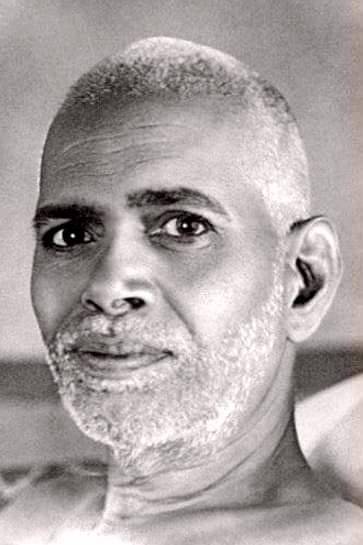
GURU KATAKSHA IS LIKE AN ELEPHANT DREAMING ABOUT A LION
Q: “The ancients say that for a person who wants to know that real state sadhana, sravana, manana, and nididhyasana are absolutely necessary till the very end.”
Bhagavan replied, “They are necessary only to get rid of the various things that come from outside and that too for purposes of sadhana only, but not for realizing the Self. One’s own self is there at all times and in all places. Sravana, etc., are to be resorted to only to get rid of external influences, but if they are regarded as the most important things they will be the cause of the development of the feelings of ahankara, such as ‘I am a pandit’ (learned man), ‘I am a great man’ and the like. That is a big samsara (family). It is difficult to get rid of it later on. It is bigger than a wild elephant. It will not yield ordinarily.
“For that wild elephant, it is said that Guru Kataksham (the Grace of the Guru) is like seeing a lion in its dream,” said the questioner.
“That is true. If an elephant sees a lion in its dream, it wakes up startled and will not sleep again that day for fear that the lion might appear again in a dream. In the same way in a man’s life which is also akin to a dream, it is not Guru Kataksham alone, but also sravana, manana, nididhyasana, etc., that are akin to the sight of a lion in a dream. As they go on getting these dreams they wake up, and again go to bed and by efflux of time they may some day get a lion’s dream called Guru Kataksham in an intense manner.
They get startled and obtain jnana. Then there will be no more dreams and they will not only be wakeful at all times but will not give room for any dreams of life but will remain alert until that true and real knowledge is obtained. These lion’s dreams are unavoidable and must be experienced,” said Bhagavan.
With some surprise, that questioner said, “Are sravana etc. and Guru Kataksha akin to dreams?”
“Yes, that is so. For those who realize the truth, everything is akin to a dream. That being so, what do you now say is the truth? During sleep you have no control over this body. You wander about in various places with different bodies. You do all sorts of things. At that time everything appears real. You do everything as if you are the doer. It is only after you wake up that you feel that you are a Venkiah or a Pulliah, that what you had experienced in the dream is unreal and that it was only a dream.
Not only that. Sometimes you go to bed after eating your fill at night — sweets such as laddu and jilebi. During sleep you dream that you are wandering in all sorts of places, cannot get food and are about to die of starvation. When you get up startled, you will be belching. Then you will realize that the whole thing was a dream. But during that sleep, did you remember about this (your overeating)?
Another person goes to bed suffering from starvation. In his dream, he enjoys a feast, eating laddu and jilebi. Will he remember at that time the fact that he had gone to bed hungry? No, he wakes up and finds himself terribly hungry. ‘Oh God! It is all illusion, a mere dream,’ he thinks. That is all.
You were existent in the wakeful state as well as in the dream state and also in the sleeping state. When you are able to understand your state which had been existent all the time, you will then understand that all the rest is like a dream. When that is known, the feeling that the Guru is different from you will disappear. But then, since this realization must come about because of Guru Kataksha, that Guru Kataksha is likened to a dream of a lion.
That dream must be intense and must imprint itself in one’s mind. It is only then that a proper wakefulness will come about. For that, the time must be propitious. If sadhana is performed relentlessly, some time or other favorable results turn up. That is all.” So saying, Bhagavan assumed a dignified silence.
The clock struck four. The people in the hall who were completely absorbed in this spiritual discourse of Bhagavan came back to their own consciousness. The voice of Bhagavan was ringing in my ears. I returned, wondering whether at any time in this life I would get that lion’s dream of Guru Kataksha and get it imprinted on my mind.
- Letters from Sri Ramanasramam, May 18th, 1947
7 notes
·
View notes
Text
NIDIDHYASANA
(INTENSE CONCENTRATION)
Dr. Syed asked,
"Bhagavan says the whole world is the swarupa of Atma. If so, why do we find so many troubles in this world?"
With a face indicating pleasure, Bhagavan replied "That is called Maya.
In Vedanta Chintamani, that Maya has been described in five ways. One by name Nijaguna Yogi wrote that book in Canarese. Vedanta has been so well dealt with in it, it can be said to be an authority on the Vedanta language.
There is a Tamil translation.
The five names of Maya are,
Tamas, Maya, Moham, Avidya and Anitya. Tamas is that which hides the knowledge of life.
Maya is that which is responsible for making one who is the form of the world appear different from it.
Moha is that which makes a different one look real: sukti rajata bhranthi
- creating an illusion that mother-of-pearl is made of silver.
Avidya is that which spoils Vidya (learning). Anitya is transient, that which is different from what is permanent and real.
On account of these five Mayas,
troubles appear in the Atma like the cinema pictures on the screen.
Only to remove this Maya it is said that the whole world is mithya (unreal).
Atman is like the screen.
Just as you come to know that the pictures that are shown are dependent on the screen and do not exist otherwise, so also, until one is able to know by Self-enquiry that the world that is visible is not different from Atma, it has to be said that this is all mithya. But once the reality is known, the whole universe will appear as Atma only.
Hence the very people who said the world is unreal, have subsequently said that it is only Atma swarupa.
After all, it is the outlook that is important. If the outlook changes, the troubles of the world will not worry us.
Are the waves different from the ocean?
Why do the waves occur at all?
If asked, what reply can we give? The troubles in the world also are like that. Waves come and go. If it is found out that they are not different from Atma this worry will not exist."
That devotee said in a plaintive tone, "However often Bhagavan teaches us, we are not able to understand."
"People say that they are not able to know the Atma that is all-pervading.
What can I do?
Even the smallest child says,
'I exist. I do; and this is mine.
So, everyone understands that the thing !' is always existent. It is only when that 'l' is there, the feeling is there that you are the body, he is Venkanna, this is Ramanna and the like.
To know that the one that is always visible is one's own self, is it necessary to search with a candle?
To say that we do not know the Atma swarupa which is not different but which is in one's own self is like saying 'I do not know myself, said Bhagavan.
"That means that those who by sravana (hearing) and manana (repeating within oneself) become enlightened and look upon the whole visible world as full of Maya, will
ultimately find the real swarupa by nididhyasana," said the devotee.
"Yes, that is it. Nidi means swarupa; nididhyasana is the act of intensely concentrating on the swarupa with the help of sravana and manana of the words of the Guru. That means to meditate on that with undeflected zeal. After meditating for a long time, he merges in it. Then it shines as itself. That is always there. There will be no troubles of this sort if one can see the troubles of this sort if one can see the thing as it is. Why so many questions to see one's own self that is always there?" said Bhagavan.
- Letters from Sri Ramanasramam. (119)
1 note
·
View note
Text
DAILY WISDOM - 313 - 8. Creating a Flash of Intuition / నిత్య ప్రజ్ఞా సందేశములు - 313 - 8. అంతర్ దృష్టి యొక్క మెరుపును సృష్టించడం
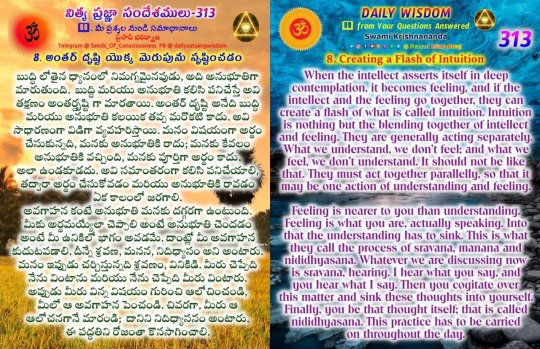
🌹. నిత్య ప్రజ్ఞా సందేశములు - 313 / DAILY WISDOM - 313 🌹
🍀 📖. మీ ప్రశ్నలకు సమాధానాలు నుండి 🍀
📝 .స్వామి కృష్ణానంద 📚. ప్రసాద్ భరద్వాజ
🌻 8. అంతర్ దృష్టి యొక్క మెరుపును సృష్టించడం 🌻
బుద్ధి లోతైన ధ్యానంలో నిమగ్నమైనపుడు, అది అనుభూతిగా మారుతుంది. బుద్ధి మరియు అనుభూతి కలిసి పనిచేస్తే అవి తక్షణం అంతర్దృష్టి గా మారతాయి. అంతర్ దృష్టి అనేది బుద్ధి మరియు అనుభూతి కలయిక తప్ప మరొకటి కాదు. అవి సాధారణంగా విడిగా వ్యవహరిస్తాయి. మనం విషయంగా అర్థం చేసుకున్నది, మనకు అనుభూతికి రాదు; మనకు కేవలం అనుభూతికి వచ్చింది, మనకు పూర్తిగా అర్థం కాదు. అలా ఉండకూడదు. అవి సమాంతరంగా కలిసి పనిచేయాలి, తద్వారా అర్థం చేసుకోవడం మరియు అనుభూతికి రావడం ఏక కాలంలో జరగాలి.
అవగాహన కంటే అనుభూతి మనకు దగ్గరగా ఉంటుంది. మీకు అర్థమయ్యేలా చెప్పాలి అంటే అనుభూతి చెందడం అంటే మీ ఉనికి లో భాగం అవడమే. దాంట్లో మీ అవగాహన కుదుటపడాలి. దీన్నే శ్రవణ, మనన, నిదిధ్యాసం అని అంటారు. మనం ఇప్పుడు చర్చిస్తున్నది శ్రవణం, వినికిడి. మీరు చెప్పేది నేను వింటాను మరియు నేను చెప్పేది మీరు వింటారు. అప్పుడు మీరు విన్న విషయం గురించి ఆలోచించండి, మీలో ఆ అవగాహన పెంచండి. చివరగా, మీరు ఆ ఆలోచనగానే మారండి; దానిని నిదిధ్యాసనం అంటారు. ఈ పద్ధతిని రోజంతా కొనసాగించాలి.
కొనసాగుతుంది...
🌹 🌹 🌹 🌹 🌹
🌹 DAILY WISDOM - 313 🌹
🍀 📖 from Your Questions Answered 🍀
📝 Swami Krishnananda 📚. Prasad Bharadwaj
🌻 8. Creating a Flash of Intuition 🌻
When the intellect asserts itself in deep contemplation, it becomes feeling, and if the intellect and the feeling go together, they can create a flash of what is called intuition. Intuition is nothing but the blending together of intellect and feeling. They are generally acting separately. What we understand, we don't feel; and what we feel, we don't understand. It should not be like that. They must act together parallelly, so that it may be one action of understanding and feeling.
Feeling is nearer to you than understanding. Feeling is what you are, actually speaking. Into that the understanding has to sink. This is what they call the process of sravana, manana and nididhyasana. Whatever we are discussing now is sravana, hearing. I hear what you say, and you hear what I say. Then you cogitate over this matter and sink these thoughts into yourself. Finally, you be that thought itself; that is called nididhyasana. This practice has to be carried on throughout the day.
Continues...
🌹 🌹 🌹 🌹 🌹
0 notes
Photo
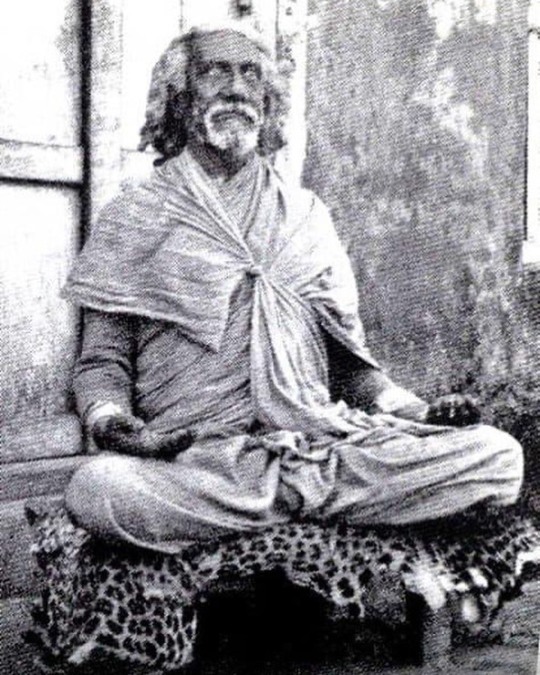
The Holy Science Swami Sri Yukteswar Sutras 1-4 "Yajna, sacrifice, means penance (Tapas), deep study (Swadhyaya), and the practice of meditation on Aum (Brahmanidhana). Penance is patience or evenmindedness in all conditions (equanimity amidst the essential dualities of Maya; cold and heat, pain and pleasure, etc.). Swadhyaya consists of reading or hearing spiritual truth, pondering it, and forming a definite conception of it. (Meditation on) Pranava, the Divine sound of Aum, is the only way to Brahman (Spirit), salvation. Patience, faith, and holy work explained. Tapas is religious mortification or patience both in enjoyments and in sufferings. Swadhyaya is sravana, study, with manana, deep attention, and thereby nididhyasana, forming of an idea of the true faith about Self; that is, what I am, whence I came, where I shall go, what I have come for, and other such matters concerning Self. Brahmanidhana is the baptism or merging of Self in the stream of the Holy Sound (Pranava, Aum) which is the holy work performed to attain salvation and the only way by which man can return to his Divinity, the Eternal Father, whence he has fallen." Sutras 5, 6 "Aum is heard through cultivation of Sraddha (heart's natural love), Virya (moral courage), Smriti (memory of one's divinity), and Samadhi (true concentration). Sraddha is intensification of the heart's natural love. How the Holy Sound manifests. This Holy Sound Pranava Sabda manifests spontaneously through culture of Sraddha, the energetic tendency of the heart's natural love; Virya, moral courage; Smriti, true conception; and Samadhi, true concentration. The virtue of love. The heart's natural love is the principal requisite to attain a holy life. When this love, the heavenly gift of Nature, appears in the heart, it removes all causes of excitation from the system and cools it down to a perfectly normal state; and invigorating the vital powers, expels all foreign matters - the germs of diseases - by natural ways (perspiration and so forth). It thereby makes man perfectly healthy in body and mind, and enables him to understand properly the guidance of Nature The Holy Science Swami Sri Yukteswar #yukteswar https://www.instagram.com/p/CetHp23BBXh/?igshid=NGJjMDIxMWI=
0 notes
Photo
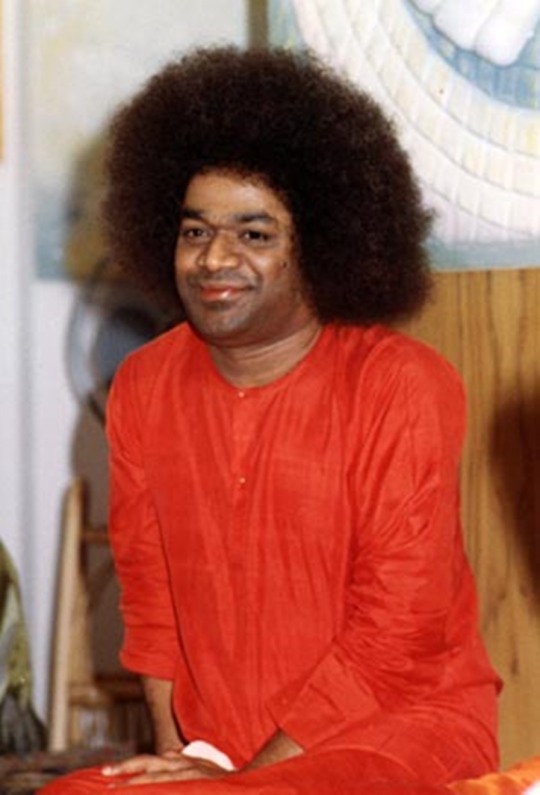
MENSAJE SAI DEL DÍA
JUEVES 10 SEPTIEMBRE DE 2020
OM Sri Sai Ram
Las Upanishads prescriben ciertas prácticas espirituales (“sadhanas”) como remedio para librarse del diálogo interno constante (“manasika-sambhashana”), el cual es un obstáculo para la paz interior. La primera, es la regulación de la respiración (“pranayama”). El pranayama no es una gimnasia ni un ejercicio formidable. La mente debe concentrarse en el período de retención del aire (“kumbhaka”), en el proceso de inhalación (“puraka”) y en el de exhalación (“rechaka”). Cuando la atención es fijada de esta manera, se le dará fin a la conversación interna sobre temas irrelevantes y se adquirirá fuerza mental. La segunda práctica espiritual, es meterse de lleno en actividades beneficiosas, es decir, en el servicio a los demás ayudándolos a reducir el sentido del ego y en actos que sean buenos y piadosos. Cuando nuestros pensamientos se ocupan en tales actividades, la mente se aparta de la conversación en la que acostumbra enredarse. Por otra parte, la práctica de escuchar los consejos espirituales, reflexionar acerca de ellos, y descubrir formas y medios de confirmar la fe en el Espíritu (“sravana-manana-nididhyasana”), así como la recitación de los nombres de Dios y el retiro de la mente de la persecución de lo sensorial (“japa” y “tapa”), han sido prescriptos por las Escrituras para silenciar esta divagación mental.
- Vidya Vahini, capítulo 18. Bhagawan Sri Sathya Sai Baba.
1 note
·
View note
Text
Neti Neti
Neti Neti, I am not the Body
Neti Neti, I am not the Mind
If I am not the Body and Mind
Who am I? This must be defined
Tat Twam Asi, I am the Divine Soul, I find
If the Truth you want to know
Then on a Journey, you must go
You must Realize 'You are That, not this'
Until you realize the truth, there will be no bliss
Then only will Heaven open its door
Ghor Avidya is Gross Ignorance
I lived with the Myth, in a trance
Because I didn't know this was just my name
I got caught in my wealth and my fame
And the Truth just missed my glance
This world is a Leela, a drama I see
We are just Actors, just transitory
The earth is a Stage, we come and we go
Nothing is real, it is all just a show
We must transcend the Mind and Ego, ME
Tattva Bodha is the Knowledge of the Body
We are made of elements five
From dust we come and to dust we will go
This Body is not real, this Truth we must know
To Realize this Truth, we must strive
Atma Bodha is the Wisdom of the Soul
It is the Power that makes us roll
When we realize we are the Atman, the Soul, the Spirit
Not the skin that is outside, but the Power that is in it
Then we achieve our Life's ultimate goal
We must start a Talaash, a Quest
And put all our beliefs to test
We must Ask, Investigate and Realize
Only then will we open our 'real' eyes
And our Ignorance will come to rest
Sravana, Manana, Nididhyasana
The steps to the Truth are three
We must first read and then listen
And contemplate to realize what is within
Then from Rebirth we will be free
Sat Darshana is the Vision of the Truth
It helps us catch the evil brute
It makes us realize we are not the Body and Mind
We are the Soul, we Realize and we find
As we get to the bottom of the root
Maya is a Cosmic Illusion
It makes us live in delusion
It has the power to project the Myth
As it does, it conceals the Truth
And thus, it corrupts our vision
Aparoksh Anubhuti is Intuitive Realization
We experience the Truth and get Liberation
It is not knowledge that we can get from a book
It is beyond what the ordinary eyes can look
But the reward is Divine Unification
Why are we talking of all this?
We don't realize that this is Bliss
When we go on a quest, our beliefs to test
We search and search with all our zest
We must not stop or the reward we will miss
There are many who are caught in this world of pleasure
They think that money and wealth is the real treasure
They are prisoners of their Body and Mind
They are the Soul, this Truth they don’t find
True Peace and Bliss of life they fail to measure
There are some who use their Intellect
What is the Truth, they detect
Viveka Chudamani is a treasure, they find
It kills the rascal, the Monkey Mind
And then in Ananda they rest
Tat Twam Asi, Thou Art That
Not this, not this, we are That
We are not the Body that we seem to be
Not the Mind and Ego that says, ‘It’s ME’
We are the Divine Soul, in fact
We are the Waker, the Dreamer, the Sleeper - states three
From this Ignorance we must be free
We are Chaturyam, or Turiyam, the state that’s fourth
To this Truth we must all march forth
Then the Witness, the Observer we will be
Satyam Shivam Sundaram, do you know…
It is a mantra, the Truth it will show
Translated, it means, ‘The Truth is God is Beautiful’
Without God, there will be nothing wonderful
With Realization, into this we grow
What stops us is Ahamkara, the Ego
Which hides the Truth for the Myth to show
All along we say ‘I', 'me' and 'mine'
And so, in agony we live, and we whine
It's time to let go of the Ego
And then we must know about the Law of Action
Karma is the Law of Reaction
It states, 'As you sow, so shall you reap’
If you sin, you will take Rebirth and weep
From this cycle, we need Liberation
What is the reward if all this we do?
We will be Free from suffering, that is true
Jivanmukti is a state of Bliss
It overcomes all misery, this we must not miss
Otherwise, we will live as if in a zoo
A Steady Intellect can transcend the Mind
When the Intellect is Steady, we are Sthitpragya we find
It is about living with Realization
And not letting go of Liberation
Until we unite with the Divine
To Realize the Truth, we must live in Yoga
Not sink in this world and suffer in Bhoga
Yoga is about transcending the Mind
What the world believes is a myth of a kind
Then we are Enlightened, not blind
To Realize the Truth, all this we must know
If we have to cross this worldly show
Neti Neti, Not this, Not this
Tat Twam Asi will give us Bliss
But to this Truth we must row
What is our Life's Ultimate Goal
To Realize we are the Divine Soul
Moksha, Nirvana, Enlightenment, it is called
Because of Ignorance, this Truth is stalled
Until our Death, we just roll
To Realize this Truth, we need a Master
Then to the Goal, we will go faster
It is the Guru that takes us from Darkness to Light
A Spiritual Master tells us what is right
Reward is Joy, Bliss, and Laughter
And then, our Journey to God we will start
We Realize God lives in the Temple of our Heart
God is the Power that lives Within
It is a myth that he is made of bone and skin
And from all old beliefs, we will depart
I too lived in Ignorance for years
Until I Realized the Truth with tears
I finally realized that this was just my name
And I was glad and ended all my shame
And I got rid of all my Fears
If we want God-Realization
Then we must start with Self-Realization
Are we the body and mind? We are not this
Then, we realize we are That and live in Bliss
And then, we experience Unification
But there cannot be Unification
Unless first, there is Liberation
We must be Liberated from the Ego and the Mind
We are the Soul, this Truth we must find
And all this starts from Realization
Not this Not this, start your Quest
Thou Art That, only then you rest
Till you discover who you are not
You will never Realize, in myth, you will be caught
Don't lose your Spiritual zest
0 notes
Quote
In the shade it is pleasant, in the sun it is scorching. We always have the freedom to turn within to see the light and thus enjoy the shade. When by force of old habit we wander out again, we say to Bhagavan, ‘That was only laya, I want nasa’, and he replies, ‘Turn again to the source and see if manyness exists there’. By repeatedly turning away consciously from the manyness in this way we come to see that it does not exist apart from us, and that it is therefore not something we need to fear. Some reach this realisation after just a few attempts, but for others it takes longer because their attention is not so sharp and clear.
The Paramount Importance of Self Attention, by Sadhu Om, as recorded by Michael James - Note of 19th December 1977
🕉
Note: Dissolution of the mind can be laya - temporary, or nasa - permanent
🕉
#Bhagavan Sri Ramana Maharshi#Sadhu Om#Michael James#the paramount importance of self-attention#dispassion#non-attachment vairagya#learning assimilation practice#sravana manana nididhyasana#discrimination viveka
8 notes
·
View notes
Text
Whenever you listen to you, you listen to others. When you don’t listen to others, you don’t listen to you also.
Whenever you listen to you, you listen to others. When you don’t listen to others, you don’t listen to you also.
Listen! Please come to the space of listening. Many teachers tell you, ‘However much you listen, unless you practice, it won’t help you.’ I tell you now, ‘However much you try to practice, unless you listen, it won’t help you!’
The problem is that we do not trust ourselves and our innate intelligence to respond to a question without preparation. That is why we start preparing the reply even…
View On WordPress
#Arjuna#Bhagavadgita#Bodhidharma#Commune#Completion#Integrated listening#Krishna#Listening#Manana#Mano sakti#Master#Nidhidhyasana#Nididhyasana#Nithyananda#Saankhya yoga#Shravana#silence#Sravana#Sāṅkhya Yogaḥ#Upanisad
0 notes
Text
This evening, D.S. Sarma, asked Bhagavan: “In Western mysticism three definite stages are often spoken of — viz., Purgation, illumination and union. Was there any such stage as purgation — corresponding to what we call sadhana — in Bhagavan’s life?”
Bhagavan replied, “I have never done any sadhana. I did not even know what sadhana was. Only long afterwards I came to know what sadhana was and how many different kinds of it there were. It is only if there was any object or anything different from me that I could think of it. Only if there was a goal to attain, I should have made sadhana to attain that goal. There was nothing which I wanted to obtain. I am now sitting with my eyes open. I was then sitting with my eyes closed. That was all the difference.
I was not doing any sadhana even then. As I sat with my eyes closed, people said I was in samadhi. As I was not talking, they said I was in mauna. The fact is, I did nothing. Some Higher Power took hold of me and I was entirely in Its hand.” Bhagavan further added, “The books no doubt speak of sravana, manana, nididhyasana, samadhi and sakshatkara. We are always sakshat and what is there for one to attain karam of that? We call this world sakshat or pratyaksha. What is changing, what appears and disappears, what is not sakshat, we
regard as sakshat.
We are always and nothing can be more directly present pratyaksha than we, and about that we say we have to attain sakshatkaram after all these sadhanas. Nothing can be more strange than this.
The Self is not attained by doing anything, but remaining still and being as we are.”
Day by Day
0 notes
Text
Tweeted
The qualified student practices a three fold learning discipline, starting with proper listening (Sravana), supported by reflection (Manana) and contemplation (Nididhyasana). This process leads the student to the experience (Anubhuti) of Self-Knowledge in due course of time.
— Sandeep Ozarde (@sandeepozarde) January 26, 2018
0 notes
Photo
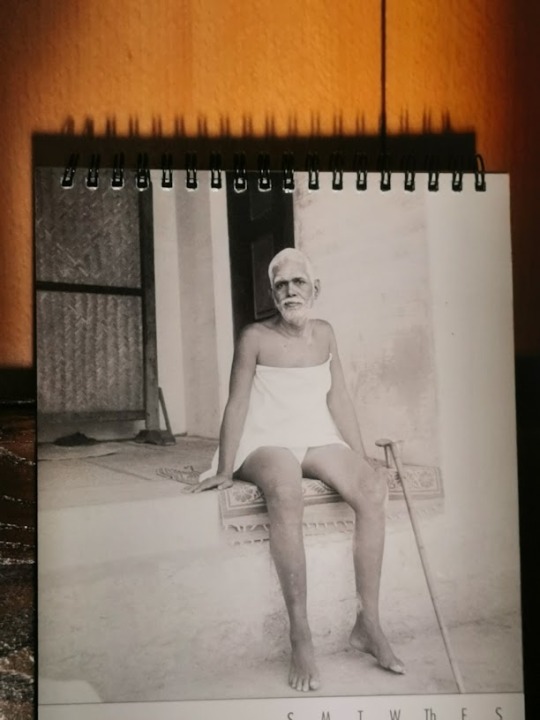
🕉️ 🔱 Om Namo Bhagavate Sri Arunachala Ramanaya 🔱 🕉️
The Paramount Importance of Self Attention, by Sri Sadhu Om, As recorded by Michael James
Part One - Mountain Path: April-June 2012 - Excerpt
Note of 19th December 1977
Sadhu Om: Dispassion (vairāgya) comes only through knowledge. It is cultivated by reflection [manana] and discrimination [viveka], and sustained by the clear conviction that everything is 'I', that nothing is independent of our own self-awareness, and that self alone exists. Why to say that a mind or ego exists in sleep in order to know 'nothingness'? Why not understand instead that it is self that knows that 'nothingness', and that that 'nothingness' itself is nothing other than self. If you can understand that, then you can understand that self also knows this 'everythingness', and that 'everythingness' is also nothing other than self.
In fact no ego or mind exists even now, so why to say it exists in sleep? There is only one 'I', so the 'I' that knows all this is only self. Why to admit the existence of an ego?
In Bhagavan's path we cannot admit the existence of any state of 'void' or 'nothingness', because in order to experience such a state we would have to exist in it, and hence it would not be devoid of ourself, but only of other things. Since nothing else exists in it, it would be full of ourself, and hence purna (full, complete), not sunya (nothing, void). To anyone who imagined they have reached a void, Bhagavan would say, 'Investigate who experiences it'. However, even that would not be necessary if we firmly cling to self-attention.
In the mangalam verse of Ulladu Narpadu Anubandham Bhagavan says that everything is self: self is that in which, of which, from which, for which, by which and which everything actually is. To tell the truth, even this (our everyday activity) is self-attention. Why then are Bhagavan's clues necessary? Only because we now mistake our natural state of self-awareness to be a state of awareness of many things other than ourself. It is only as a means to remove this mistaken experience of otherness and manyness that Bhagavan asked us to attend only to self.
An elderly devotee did not visit Bhagavan for a while because he thought he could become like Bhagavan on his own. After a long time he returned, just as Bhagavan was stitching some leaf-plates, and Bhagavan said to him, 'See, we take so much care to stitch these plates, but after eating from them we throw them away. Bhagavan is like a leaf-plate: only when he has served his purpose should you throw him away.' Therefore Bhagavan and the clues he has given us are necessary until we experience the dawn of self-knowledge, and after that we will see that we — the one self — alone exist, and that Bhagavan and his clues are also only ourself.
Our mind experiencing objects is like sunlight falling on a mirror and being reflected onto a wall. The reflection (which is like the objects we experience) is light, the reflecting mirror (which is like our experiencing mind) is light — and when looked at directly it seems to be another sun — and the sun (which is like self, the source of our mind's light of consciousness) is light. Everything is light, and the light is one. Likewise, we and all that we experience are only the one light of consciousness, which is self.
Can the mind rise without the support of self? Can it exist without self-awareness? It is all so simple, but immature minds think, 'Then self-knowledge is only like the nothingness of sleep. It doesn't look very tasty in comparison with all the interesting things outside in the world'. What can we say to them? We cannot change them, so we just have to let them suffer a bit more until they understand that oneness is peace and manyness is pain.
🕉️ 🔱 🕉️
#Bhagavan Sri Ramana Maharshi#Sadhu Om#Michael James#the paramount importance of self-attention#dispassion#non-attachment vairagya#learning assimilation practice#sravana manana nididhyasana#discrimination viveka
6 notes
·
View notes
Photo

🕉️ 🔱 Om Namo Bhagavate Sri Arunachala Ramanaya 🔱 🕉️
A Importância Suprema da Auto-Atenção, por Sri Sadhu Om, conforme registado por Michael James
Parte Um - O Caminho da Montanha: Abril-Junho de 2012 - Excerto
Anotação de 13 de Dezembro de 1977
Sadhu Om: A mente sempre sentirá que a auto-atenção é difícil, porque ela nunca pode atender a si mesma. Somente o ser pode atender ao ser.
Quando um devoto francês lhe disse que Swami Siddheswarananda [o fundador e chefe do centro da Missão Ramakrishna em França] havia dito: 'Poucos sabem quem é Bhagavan', Muruganar respondeu: 'Isso é verdade. O ashram de Bhagavan não está confinado dentro das quatro paredes deste complexo. O universo inteiro é seu ashram. O universo inteiro é ele mesmo'. Mais tarde, ele acrescentou: 'Só Bhagavan existe'. [...]
Sāstra-vāsanā (a disposição para estudar numerosos textos espirituais e filosóficos) só é criada se não se fizer mais do que sravana [leitura] e manana superficial [reflexão]. Se um pandita erudito que busca nome e fama fizesse um pouco de manana profundo, ele refletiria assim: 'Se só brahman, o único ser, existe, por que quero eu a apreciação dos outros? Onde estão os outros? Quem sou eu?'
Se a reflexão sobre as palavras do guru for feita apenas como uma ajuda para a sādhanā prática, não criará quaisquer sāstra-vāsanās. As palavras do guru sempre farão com que a mente volte para a auto-atenção, porque todas elas apontam apenas para o eu, o ser.
Para um aspirante jovem e sincero cuja mente ainda está fresca, apenas um pouco de manana é necessário. Sempre que a sua mente se desviar para fora, ele refletirá: 'Tudo o que é percebido através dos cinco sentidos é conhecido por mim, então o conhecimento de qualquer coisa apenas indica que eu sou', e assim ele restaurará facilmente a sua auto-atenção.
Durante nididhyasana [contemplação sobre o ser], um pouco de manana (ou seja, apenas alguns pensamentos) às vezes pode ajudar a evitar que a mente se desvie da auto-atenção, mas, em última análise, todos esses auxílios devem desaparecer. Em Quem sou eu? Bhagavan diz que chegará um tempo em que teremos que esquecer tudo o que aprendemos. Esquecer segundas e terceiras pessoas (tudo menos nós mesmos) traz paz; lembrar traz perturbação.
Quando era jovem, Natanananadar disse uma vez a um devoto mais velho que estava a fazer muitas perguntas a Bhagavan sobre como praticar ātma-vicāra: 'Quando o infinito auto-brilhante "Eu" está dentro de si como uma rocha, por que tem tantas dúvidas?’
🕉️ 🔱 🕉️
#Bhagavan Sri Ramana Maharshi#Sadhu Om#Michael James#a importância suprema da auto-atenção#sravana manana nididhyasana#aprendizagem assimilação prática#sastra charcha#sastra-vasana#auto-investigação#quem sou eu?
3 notes
·
View notes
Photo

Om Namo Bhagavate Sri Arunachala Ramanaya
🕉️
Devoto: Quais são os obstáculos a permanecer firme em Bem-aventurança ininterrupta? Como podem ser superados?
Maharshi: Os obstáculos são:
Ignorância que é o esquecimento do nosso próprio ser puro.
Dúvida que consiste em se perguntar se mesmo a experiência foi do Real ou do irreal.
Erro que consiste na ideia de “eu sou o corpo” e pensar que o mundo é real.
Estes são superados ouvindo a verdade, refletindo sobre ela e concentrando-se.
~ Talks with Sri Ramana Maharshi - Talk 95
🕉️
#Bhagavan Sri Ramana Maharshi#Talks#Talk 95#obstáculos#ignorância#esquecimento#dúvida#erro#escravidão#Dehātma bhāva#ideia-'eu-sou-o-corpo'#auto-investigação#quem sou eu?#learning assimilation practice#sravana manana nididhyasana#aprendizagem assimilação prática#prática da verdade
3 notes
·
View notes
Photo

🔱 Om Namo Bhagavathe Sri ArunachalaRamanaya 🔱
Fotografia de Dev Gogoi
🕉️
A Importância Suprema da Auto-Atenção, por Sri Sadhu Om, conforme registado por Michael James
Parte Quatro - O Caminho da Montanha: Janeiro-Março de 2013 - Excerto
Anotação de 1 de Janeiro de 1978
🕉️
Sadhu Om: Quando acordamos do sono, experimentamos uma nova clareza de conhecimento antes de nos tornarmos conscientes do corpo e do mundo. A prática da sādhanā é tentar agarrar-se a essa clareza.
Sentar-se no Salão Antigo [onde Bhagavan viveu] não é essencial se você puder estar ciente dessa clareza em outros momentos. [...] Há algo especial no Salão Antigo que automaticamente nos lembra do nosso próprio ser, mas é claro que podemos estar cientes do nosso ser em qualquer outro lugar também.
O esforço é desnecessário para o ser, porque a auto-atenção é natural e sem esforço. O esforço só é necessário para a mente. É da natureza do ser atender a si mesmo, e é da natureza da mente atender a segunda e terceira pessoas. Sādhanā é apenas para a mente, e o esforço para atender ao sentimento 'eu' é apenas para manter a mente quieta — em seu estado natural de pura auto-consciência.
Não é totalmente verdadeiro dizer que a auto-investigação começa com esforço e termina com a ausência de esforço, mas em consideração ao sādhaka [praticante] podemos dizer isso. Esforço é necessário enquanto a mente precisa ser lembrada da sua verdadeira natureza, 'eu sou', mas quando mesmo a consciência de segunda e terceira pessoas automaticamente lembra a nossa própria existência, 'eu sou' (porque o que está ciente delas é 'eu'), então o esforço não é mais necessário. Quando podemos ver apenas ondas, devemos fazer algum esforço para perceber o oceano por trás delas, mas quando sabemos que as ondas nada mais são do que o oceano, não é necessário esforço.
Todos os pensamentos contêm um elemento do passado ou do futuro neles. Pode criar um pensamento sobre o momento presente? Se tentar seriamente fazê-lo, todos os pensamentos, incluindo o pensamento 'eu', cessarão. Esta é outra pista para a auto-atenção. Há tantas pistas, sabe.
🔱 🔱 🔱 🔱 🔱 🔱
Pergunta: Na prática, nunca prestamos atenção a nós mesmos. Em todo o tempo que passamos no Salão Antigo, estamos apenas a tentar fazê-lo. Se realmente atendêssemos ao nosso ser por um momento, isso seria libertação, não seria?
Sadhu Om: O quê, quer dizer que mesmo agora não está libertado? Não está sempre atendendo a si mesmo? Você sabe [que] 'eu sou', e só sabe de algo se estiver a prestar atenção nisso. Mesmo quando atende a segunda e terceira pessoas, é o 'eu' que está atendendo, e esse 'eu' está sempre consciente de si mesmo.
Tal manana [cogitação ou reflexão profunda] é essencial até que você entenda completamente que a auto-atenção é natural e eterna e que tudo o mais brilha pela luz dessa auto-consciência. Este manana o levará até à fronteira. Nididhyasαnα [contemplação, a prática da pura auto-atenção] é na verdade apenas por um momento. Quando você realmente pratica o que ouviu e compreendeu, você cruza a fronteira, e isso é jñāna.
Ignore a mente, ela não precisa preocupar-nos. Nós não somos a mente, então, quando perdermos o interesse por ela, ela morrerá de morte natural. É por isso que Bhagavan está sempre a chamar a nossa atenção para o ser. Ele nunca permite que nos interessemos pela mente pensante ou qualquer outra coisa que não seja o sentimento 'eu'.
'O que é este 'eu'? Qual é a fonte de onde ele aparece?' — Tudo o que é necessário é que o nosso interesse por esse sentimento 'eu' aumente. Isso é bhakti.
Investigação, fé e bhakti não são contraditórios. Todas elas são necessárias. A investigação começa com a fé. A menos que tenhamos fé no guru que nos diz que a auto-atenção é o meio para a verdadeira felicidade, não estaremos interessados em atender à primeira pessoa. E quando praticamos a auto-atenção, a nossa experiência de clareza interior confirma a nossa fé e, assim, o nosso amor pelo guru aumenta.
Algumas pessoas pensam que podem praticar a auto-investigação, então não precisam de fé ou bhakti. Essas pessoas não sabem nem o que é bhakti nem o que é realmente a investigação.
O propósito do guru externo é fazer-nos entender a necessidade de auto-atenção e acender o amor por ela no nosso coração. É claro que para isso não é necessária uma pessoa viva. Os livros de Bhagavan servem ao mesmo propósito, e ele nos fornece companheiros devotos e outras ajudas externas conforme e quando necessário. O ambiente ou as circunstâncias em que vivemos são fornecidos pelo guru, que sabe qual é o ambiente mais adequado para nos amadurecer.
Quando começamos a tentar prestar atenção à primeira pessoa, o guru interior, que é o eu, começará a trabalhar. Sempre que atendemos ao 'eu', o trabalho do guru está a acontecer. Assim que nos tenha sido dado o gosto pela auto-atenção, o nosso amor por ela naturalmente aumenta e amadurece, como o impulso de uma bola de borracha que salta por um lance de escadas.
Pensar na verdadeira grandeza de um jñāni é um bom meio de aquietar a mente. Quando o neto de Arjuna, o rei Parikshit, foi amaldiçoado de que morreria em sete dias, ele foi até ao seu guru, Suka Brahmarishi. Suka disse-lhe que ele era afortunado, porque tinha garantidos sete dias, e então começou a contar a história de Krishna. Parikshith estava tão absorto em ouvir a grandeza de Krishna que seis dias passaram despercebidos, e quando Suka o lembrou que ele morreria naquele dia, ele respondeu, 'Quem morrerá, só este corpo!' Ouvir sobre Krishna lhe deu jñāna. Às vezes, quando eu pensava em Bhagavan e na sua verdadeira grandeza, horas passavam sem que eu percebesse. Grandes jñānis são tais que até mesmo pensar neles pode aquietar nossa mente.
🔱
#Bhagavan Sri Ramana Maharshi#a importância suprema da auto-atenção#Sadhu Om#Michael James#Sadguru#raine sage#associação com sábios#guru-bhakti#devoção#fé#auto-atenção#auto-investigação#quem sou eu?#sravana manana nididhyasana
1 note
·
View note
Text
À sombra é agradável, ao sol é escaldante. Sempre temos a liberdade de nos voltarmos para dentro para ver a luz e assim desfrutar da sombra. Quando pela força do velho hábito saímos novamente, dizemos a Bhagavan: “Isto foi apenas laya, eu quero nasa”, e ele responde: “Volte-se novamente para a fonte e veja se a multiplicidade existe lá”. Ao nos afastarmos conscientemente da multiplicidade repetidamente, vemos que ela não existe à parte de nós e que, portanto, não é algo que precisamos temer. Alguns alcançam esta percepção depois de apenas algumas tentativas, mas para outros leva mais tempo porque a sua atenção não é tão aguda e clara.
~ The Paramount Importance of Self Attention (A Importância Suprema da Auto-Atenção), de Sadhu Om, como registado por Michael James - Anotação de 19 de Dezembro de 1977
🕉
Nota: A dissolução da mente pode ser laya - temporária, ou nasa - permanente
🕉
#Bhagavan Sri Ramana Maharshi#Sadhu Om#Michael James#a importância suprema da auto-atenção#sravana manana nididhyasana#aprendizagem assimilação prática#desapego#vairagya#renúncia#discriminação viveka
1 note
·
View note